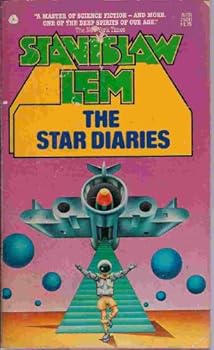Book Overview
Ijon Tichy, Lem's Candide of the Cosmos, encounters bizarre civilizations and creatures in space that serve to satirize science, the rational mind, theology, and other icons of human pride. Line... This description may be from another edition of this product.
Format:Paperback
Language:English
ISBN:0380018128
ISBN13:9780380018123
Release Date:January 1977
Publisher:Avon Books
Length:321 Pages
Weight:0.40 lbs.
Customer Reviews
5 ratings
The best!
Published by Thriftbooks.com User , 19 years ago
The best book from Ijon Tichy series. The set of stories is the best I read from this series. The stories, written in various years, show how diverse Lem is. Some of the themes he touches here are very serious, e.g.planet with the 'water cult', planet with 'no identity' people, religious monk/robots, etc. Some are masterpieces of sci-fi humor (multiplication of Tichy on the ship is just the best), some are just a simple fun (twentieth voyage with the attempt to fix the past from the future with the outcome that anything significant that happened to the human race is because of mistakes in trying to fix the history). Highly recommended to anyone (not only sci-fi fans). And by the way - it is totally different from 'Solaris'.
Brilliant
Published by Thriftbooks.com User , 22 years ago
If you like Lem, this is one of his best. It's not really science fiction, it's the discharge of neurons in a fireworks display.
Gulliver's Journeys in space
Published by Thriftbooks.com User , 23 years ago
"The Star Diaries" cannot be easily classified, probably because of its varied content. In any case, this isn't science fiction. This is philosophical satire, although it isn't clear what precisely it satirizes. The theme isn't consistent. The book is intended as a recollection of a spacefarer's unbelievable journeys, with each story being a separate adventure. Each is numbered, but the enumeration contains gaps, and, in any case, the numerical order isn't the chronological (the chronological order is 22, 23, 25, 11, 12, 13, 14, 7, 8, 28, 20, 21). If one does read the stories in the chronological order, a certain evolution becomes clear: the earlier stories are light-hearted social satire with Ijon Tichy as the book's extremely close-minded but nevertheless courteous and polite hero romping about on alien planets ("Due to the retardation of the passage of time, my sneeze lasted five days and five nights, and when Tarantoga again opened the little door, he found me nearly unconscious with exhaustion", 12th Journey); but with each new journey the reader is bound to notice that the backgrounds begin to become more and more Earthlike, the cheerful pseudo-sci-fi camouflage is dropped, and Ijon himself becomes a convention designed to deliver the plot's message. Some of these later journeys begin to drag quite impressively (20 bored me to tears - especially when I realized that it's a direct copy of a shorter story in the "Further Reminiscences"), but from time to time deliver an incredibly potent message (13 and 21 being the most prominent examples - both dealing with personal freedoms). Of the earlier romps, 7 (a multiple time loop causes Ijon to live and re-live every part in a scandal over who should go and repair the rudder), 12 (Ijon is stranded on Amauropia with a time machine, and, by speeding up the evolution of a race of local cave people, is forced to live through all the tribulation a tribe, a feudal kingdom, a theocracy, a Republic, and a militaristic regime can offer), and 14 (Ijon tours a planet whose high-tech amoeboid natives have a titanic taboo centered about the concept of "scrupts") seem to be the most fun.The faults? As I mentioned, some of the later stories drag quite a bit, especially when the reader isn't prepared for a lesson in philosophy. Those looking for "Hitchhiker's Guide" sort of fiction will only be able to stomach about half the book. From time to time, Lem slips into writing entirely in and about fictional (read - "nonsensical") things. Of course, not all the nonsense is really non-sense: Lem relied on plays of words and puns for some of the humor, and most was probably lost in the translation (I was lucky to read it in the next best thing to the original Polish - Ukrainian). Nevertheless, this is a startling, mind-bending, and superbly original read which should not be missed.
great
Published by Thriftbooks.com User , 25 years ago
joe missed the point of this one. Since when are Lem's stories plot-driven? Some books even lack a story line altogether (which, of course, does not lessen their impact). The 20th Voyage is a wonderful satire on the scientific endeavor and mistaken human superiority and is very carefully constructed - it takes a few reading to realize that the time loop makes perfect sense and actually says a bit about the future of humanity. These stories aren't brain candy but rather sophisticated. Therefore, don't expect a thrill-rides, but idea-driven tales.
Ijon Tichy rules!
Published by Thriftbooks.com User , 26 years ago
My understanding is that the three books featuring space traveller Ijon Tichy were originally published in Polish in a single volume (THE FUTUROLOGICAL CONGRESS, THE STAR DIARIES, and MEMOIRS OF A SPACE TRAVELLER). If so, I would insist that that has to be one of the ten greatest science fiction books ever published. The highpoint of the Tichy tales is THE FUTUROLOGICAL CONGRESS, which is published as a separate book in English, but the stories in THE STAR DIARIES are very nearly as good (the remnants were published in the MEMOIRS). Essential reading. They come across as some demonic blend of Italo Calvino, Escher, and Groucho Marx. Most sci-fi writing is deeply derivative from previous writers, but Stanislaw Lem is possibly the most original sci-fi writer of the past forty years. I am one of those who believe that Lem should have received serious consideration for a Nobel Prize.





